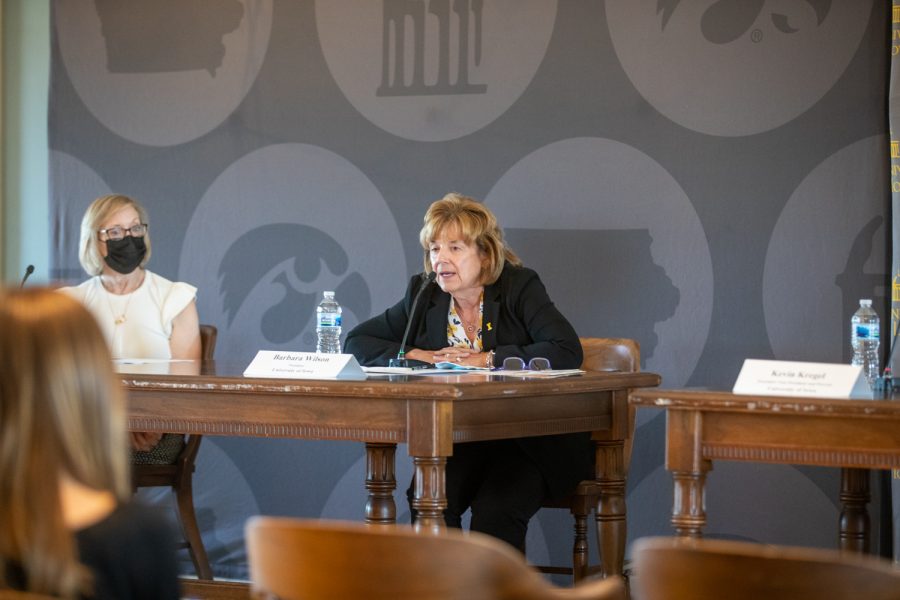UI to maintain current COVID-19 guidance despite faculty petition
The University of Iowa will not change most of its COVID-19 guidance regarding mask or vaccine mandates, random testing, or in-person classes this fall.
University of Iowa President Barbara Wilson speaks with media during a press conference at the Old Capitol in downtown Iowa City on Monday, Aug. 16.
August 16, 2021
After faculty members asked for more protections against COVID-19 this fall, the University of Iowa is not planning to change its guidance any time soon.
UI President Barbara Wilson said at a press conference on Monday that the university is monitoring the spread of novel coronavirus on campus, but she hopes to not make any changes to the guidance.
“I’m hoping that many people will recognize that we’re all in this together. This isn’t a political issue, it’s a health issue,” she said. “The more people who decide this university matters, this community matters and I’m going to do my part –– so that’s the message going forward.”
With the move-in of 5,600 students beginning this week in the UI’s residence halls, she said she is quite pleased thus far with mask wearing among students.
Two weeks ago, hundreds of staff and faculty members signed a petition asking for vaccine and mask mandates on campus. At the press conference, Wilson said she is in regular communication with the state Board of Regents and is keeping them informed on the UI’s COVID-19 numbers and protocol.
A week out from the beginning of the fall semester, UI Provost Kevin Kregel said the university does not have plans to move in-person classes online this fall. One of the requests made in the petition is reinstating flexible work arrangements, including allowing faculty and staff to meet with students via Zoom regardless of class size.
“Right now, we’re not envisioning the transition away from what’s already in the schedule for the fall semester in terms of face-to-face opportunities,” he said. “…There are going to be opportunities to evaluate that as we move forward, especially in the first weeks of the semester.”
RELATED: President Wilson talks tuition, state funding fluctuations
Another request from faculty in the petition was to regularly test unvaccinated staff and students for COVID-19. Wilson said there will not be any form of random testing this year, but the school is monitoring the wastewater of all residence halls weekly on campus and students can access testing if they want.
In the spring 2021 semester, the university piloted the program, testing the waste of Daum and Mayflower residence halls.
“That will be a good, implicit, indirect assessment of whether we have any outbreaks anywhere,” she said. “I think that’s the main thing. We’re really going to rely on people’s ability to think about the collective.”
She said the university is also planning to begin a campaign with students to help encourage their peers to practice COVID-19 safety. The details of the campaign have yet to be announced.
Chief Medical Officer of the UI Hospitals and Clinics Theresa Brennan said students can test through the university’s facilities and get results within hours.
Brennan said if students, faculty, or staff members feel ill or experience symptoms of COVID-19, they should get tested, regardless of any prior commitments.
“Many people feel an obligation to come in [to work], even if they don’t feel well,” she said. “I think what we’re seeing with COVID is, even though it may be asymptomatic, many people, in retrospect, feel like, oh there was something that might’ve been like they had a headache or they’re more fatigued or a little more stuffed up, those things should prompt a test.”
As the university gets closer to classes starting, Wilson said it will continue to send out case numbers to the campus community and will look at a number of statistics prior to changing any of its approaches to the fall semester.
“We’re watching carefully at hospital rates and if we have any kind of outbreak on campus through the wastewater testing, those are the things we’re looking at,” she said. “… It’s different for every hospital and it’s different for every community, but we are working on that constantly – daily we’re looking at numbers.”



